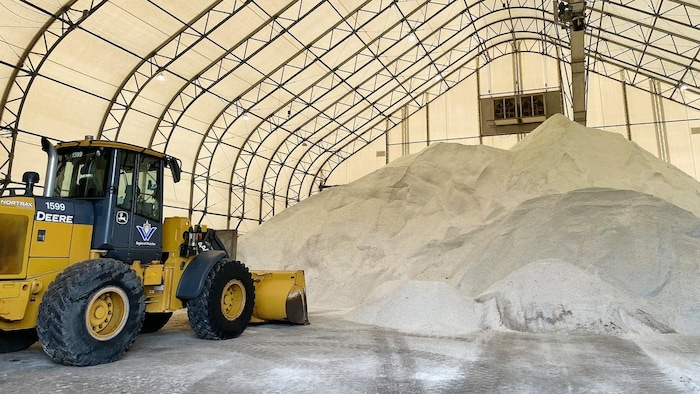Open in full screen mode This de-icing salt, which will be used on the roads of the Waterloo region in winter, is stored in Cambridge. Radio-Canada Feature in trial Log inCreate my account Speech synthesis, based on artificial intelligence, makes it possible to generate spoken text from written text. We must reduce the use of de-icing salt on roads in winter. This is imperative for the health of Ontario's lakes and groundwater, which are experiencing “very rapid salinization,” say researchers at the University of Waterloo. We use a lot of salt, and salt is a very effective way to ensure that roads, sidewalks and parking lots are free of ice, which, of course, is important to keep road users safe and pedestrians, explains Philippe Van Cappellen, professor and researcher at the University. But I think it is also very, very It's important to realize that there is a downside to using salt, he adds. Mr. Van Cappellen is one of the authors of a recently published study on the subject. The researchers focused specifically on Wilcox Lake in Richmond Hill, a suburb of Toronto. They looked at salinity and found a dramatic increase in salinity in the lake over the past almost 30 years. The study, published this month in the journal Science Of The Total Environment, includes analyzes of water chemistry, land use, and climate data dating back to 1996, as well as recent water testing. As salinity increased, Van Cappellen observed a decrease in oxygen in the lake. Increased salinity increases the density of the water, making it more difficult for the lake to mix, he explains. And it is this mixture that allows oxygen, which is on the surface, to travel to the bottom, where plants and animals that depend on it live. When oxygen is depleted, only microorganisms can survive, says Van Cappellen. These microorganisms often produce harmful byproducts. This can create a rotten egg smell in the air, due to the production of hydrogen sulfide by certain bacteria in the absence of oxygen, he explains. It also limits the percentage of the lake that is habitable for [certain] organisms, such as fish, he adds. It really affects the water quality, this really affects the biodiversity of the lake. Mr. Van Cappellen, who also holds a Canada Excellence Research Chair, wants local municipalities to discuss their use of de-icing salt, setting goals such as reducing its use by 25% in the next five years. It's not something that can wait another 10 or 20 years, he says. I think this should be an ongoing process. Some municipalities have experimented with different methods of de-icing roads, sidewalks and parking lots. Calgary and Winnipeg, for example, used a blend that included beet juice. In the United States, towns in the state of Wisconsin have experimented with cheese brine. For his part, David Pressey, Waterloo Region's director of transportation operations, said the municipality is aware of concerns about the use of de-icing salt and has actively worked to reduce its use. We need to ensure that road users can get from their homes to the grocery store and back without incident. That's our main concern, he said. Mr. Pressey says the region will use saline solutions this year in an effort to reduce the amount of crystal salt spread on the roads. With information from CBC 's Kate Bueckert
There is an urgent need to reduce the amount of salt on our roads, researchers say

